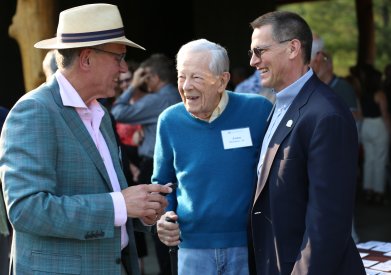Purpose vs. Payment
September 11, 2013
The 2013 ABIM Foundation Forum was entitled “Purpose vs. Payment: Motivating Change in Health Care.” The title was, of course, a false dichotomy.
Going into the meeting, I was pretty sure that the collective answer would be “both, of course!” But as the animated and spirited conversations among the participants continued over the three-day meeting, I was struck by how much more captivating, engaging and fulfilling it was to be thinking about purpose rather than payment.
Payment is a huge force in health care. In many important ways, the resources we have (or don’t have) determine what we are able to do. Oddly enough, GE wants to be paid for their MRI machines; to get one in your community, somebody needs to come up with the funds. The same holds true for the people who work in health care, whether they are answering phones, changing bedpans or practicing medicine. Money is required to build the buildings we practice in, develop and ship the drugs we use, acquire the furniture we sit on, and so on. The great—and terrible—thing about money is there can always be more or less. As a community surgical colleague of mine said as he reflected ruefully on the demise of his group over a dispute about who got how much, “I never cared about the money; that’s just a way of keeping score.”
To me, winning or losing that scorekeeping game never seemed to be especially fulfilling or gratifying. As a primary care physician, I earned a living for sure, making less than many of my specialty colleagues but more than most of my patients. Some years were financially better than others. But I–and I suspect most of my clinical colleagues–never equated a “good financial year in practice” with feeling good about my life as a doctor. It was much more about how well I met my patients’ needs, how well I fulfilled the professional and my personal notion of what it means to be a good doctor. I suspect this holds true for most of us. If we can move away from seeing money as the “scorekeeper” to seeing it as the enabler of achieving goals we all care about, we are more likely to have a happier and healthier professional life.
We all learn things in training we never forget. One of my durable experiences arose a night I was on call at Bellevue. Many remember the system: every third night call, working 36 hours straight—including the day before and the day after—and being the admitting intern for one of a series of six teams that were covering the hospital that night. If you stayed in touch with the ER, you could find out where in the admitting rotation you stood, giving you some imperfect sense of how likely it was that you would “get another admission” and all the work that that represented. Some colleagues monitored their place in that sequence very carefully, trying to cope with the overwhelming workload and complete lack of control by preparing themselves for what might come. I personally tried hard not to know, to avoid viewing another sick patient as a burden that would take away the little sleep I’d get.
One evening, a colleague told me at 2 a.m. how lucky I was to be fifth up, with no chance of an admission that night. So, with a stable service, I went to sleep genuinely hopeful in my 15th floor on-call room. I was thus shocked when my pager went off at 3 a.m. telling me that, though I was not next in the rotation, my clinic patient had presented to the ER with decompensated CHF. Even in our completely fragmented, discontinuous care model, we had an aspirational rule that if your clinic patient came in when you were on, you would admit that person regardless of where you were in the rotation, something about as likely as buying a winning Powerball ticket. Rousing myself miserably from sleep, I trudged to the elevator for the ride down to the ER, cursing my luck, raging at my misfortune, blaming my colleague for telling me where I stood in the order and myself for being taken in, and despairing over the general injustice and unfairness of the universe.
But something magical and important happened on that elevator ride. As the floors counted down, I found myself re-framing my situation. “Hey,” I thought to myself, “what an incredible and wonderful opportunity. I am becoming a doctor so I can help people and I am creating relationships with patients based on that commitment. My patient—and I don’t have that many—got into trouble on exactly the night I happened to be on call and I can respond to that need with a simple elevator ride. How often in my life will I be this well-positioned to respond to an urgent need and deliver on my promise to a patient?” By the time I reached the ground, I felt privileged to be there for that patient at that time.
I know this is a crazy story. I knew at the time it was deviant for me to feel that way, even as a resident. I don’t delude myself into believing that I or my colleagues can or will pull off that kind of transformational re-framing every day. But what I learned then, and what has made the story durable for me, is that when things got hard (as they so frequently do in a career of practice), I could reach for something transcendent, meaningful and motivational to get me through. And that was purpose, not payment. I don’t believe a 25 percent salary bonus would have gotten me on that elevator or, more importantly, off the elevator prepared to do what that patient needed.
So what did I learn at the 2013 Forum? I learned that we need to find ways to use payment to achieve purpose. If health care systems, physicians and all those who deliver care can organize around purpose, we’ll find a way to make payment work.

Daniel B. Wolfson
EVP and COO, ABIM Foundation


